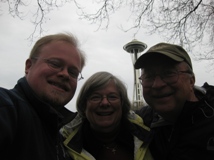Robert Webber and The Younger Evangelicals
In our family Lenten devotional and read through of A Long Obedience in the Same Direction Andy mentioned how he feel that seekers (that is, those who are seeking God) are more opened to the mystery of faith. He pointed to Robert Webber and some of his discussion on the church. I wanted to post my response about Webber because I found it pretty interesting:
I just read “An Interview with Robert Webber, author of The Younger Evangelicals“ over at The Ooze and found his categories pretty interesting (more from Robert Webber here). In looking at his categories I seem to fall in both the “Traditional Evangelicals” and “Younger Evangelicals” categories and tend to find lots of problems with the “Pragmatic Evangelicals” (In which I supposedly fit). Aside from me being in the wrong category (which is probably more of a me thing than a problem with his categorization), I found his comments pretty helpful. He noted this about the “pragmatic church”:
They responded to the sixties and seventies, created a culture-driven church and don’t get that the world has changed again. Pragmatics, being fixed, have little room for those who are shaped by the postmodern revolution. A clash is emerging. The younger evangelicals will not have a voice in the pragmatic, fixed mentality. Stay there and your spirit will die (there are some exceptions, pray for discernment). Many pragmatic churches, like old shopping malls are dying.
A postmodern setting demands relationship, participation, community, symbol, servanthood and the like. The radical renorming of biblical priorities coupled with an absolute rejection of slick marketing, showy worship and phony verbal games precede the birth of an honest, genuine, authentic community passionately engaged with being the truth.
Sounds pretty good so far. I think the pragmatic church does need to wake up to the reality of present culture. So what about the category that I most comfortably fit?
It’s quite dull and doesn’t have much to offer by way of radical commitment to community, relationship and counter-cultural values. The Ecclesial church seeks to be incarnational - the presence of Jesus in the world.
Damn. Heh, ok I (hopefully) am not so locked into the “Traditional” mode of things (and, in fact, am pretty sure I am not). I think the movement towards figuring out what it means to be a church in a postmodern culture is fairly crucial, and definitely difficult. Especially to someone who, like me, likes to be rational.
God’s Kingdom is not the Big Idea, it’s an embodied reality. This is why the church must become increasingly counter-cultural. It must embody the Kingdom in its neighborhood and call people into a new way of life.
I completely agree. Although I do wonder why it is often looked at as an “either/or” type thing. I agree that we have to have somewhat of a paradigm shift, but I am still pretty convinced that a large number of people do still appreciate rationality. Heck, the scientific community could not function if people didn’t have that mindset. John Stackhouse in his “Seminary: Who Needs It?” defends that position to a degree in how he argues for people going to seminary.
For everyone asks about the problem of evil. Everyone wants to know about how to interpret Genesis 1-3. Everyone wants to know how to take the Bible’s “tall tales” of Flood, Exodus, Jonah’s fish, and Jesus’ resurrection. And everyone wants to know how to find Christ, follow him, and enjoy his company forever–in a way that avoids extremes, or compromises, or imbalances, or pat slogans.
I think the Bible was written in a rational AND life changing way. Therefore I think our churches need to present it as such. Personally I think it has to be a combination of the old and the new. I shouldn’t down-play it at all, the new “younger evangelical” needs to play a major role in the church to help bring the congregation into the reality of our culture, but I think the old “traditional” must remain to help with the foundation.
Andy you noted “But they [the pre-modern church] recognized in a way we often don’t that God cannot be contained in a box or an explanation.” I COMPLETELY agree. And I think that is something the modernist/traditionalist needs to keep in mind without necessarily losing their (my) passion for rationality. There just needs to be that addition of the relational to the rational. As you noted in another comment, this becomes very crucial to the “horizontal” relationship with at both the community and global scale.
This has become a VERY long comment, so I will leave it at that for now, but I definitely wanted to affirm your statements about communion! It is SUCH a huge thing that, I think, has become too entrenched in ritual that many have truly forgotten what it means.
Any thoughts on this?




I don’t fit too well into his categories either. About like you, it looks like. The problem is there’s a thin line between reaching postmodern people and becoming postmodern and it’s getting crossed which leads people to reject the entire idea of reaching out. Which is sad. And no doubt this has always been a problem for the Church.
And wouldn’t rational, modern thinking be counter-cultural in a postmodern culture?
And since I’m here, the complaint about “phony verbal games”? Oh really? “The Ecclesial church seeks to be incarnational….” The Churchy church wants to what now? Yes, I know what it means and I’m not saying he’s being phony, but that could be said so much clearer. Which apparently isn’t very postmodern, I admit. “Authentic” “community” “seedal” “missional” “metanarrative” and various other words that have to be defined before the conversation begins makes me want to scream. Must we adopt opaque vocabulary to reach postmodern people?
Right Kristin, but it was just an interview…he does a lot more defining in his books!